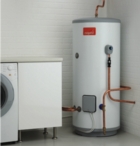A new generation of Megaflo water heaters

Heatrae Sadia has launched the next generation of its Mega HE unvented hot-water cylinder, the Megaflo eco. Key features include nearly 30% lower heat loss in actual operating conditions, with valves connected, than the previous model and a 20% improvement in flow at low pressure. These new cylinders can be installed without the need for special tools and equipment. A key benefit is the pre-wired wiring centre.
The heat loss has been reduced to 1.67 kWh a day (70 W). There is 60 mm of insulation, including the bottom of the cylinder, which increases its the diameter of the cylinder by 27 mm to 579 mm, so it can still fit through a 600 mm-wide doorway. The two immersion heaters are also insulated. The increased insulation and reduced heat loss ensures that Megaflo eco falls well within the requirements of the anticipated EuP band C, which is expected to be the minimum requirement from 2013.
The improved flow rate at low mains pressure enables, for example, an open system to deliver 48 l/min. Indirect models have titanium heating elements.
A 3-piece inlet-water valve control gives installers the flexibility to site the pressure-reducing valve at the mains-water entry point to ensure balanced pressure throughout all hot and cold outlets in a property.
These water heaters are made from 90% recyclable materials and can also work with a range of renewable-energy systems such as solar collectors and air-source heat pumps.







